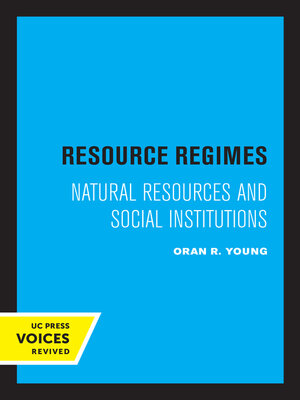Resource Regimes
ebook ∣ Natural Resources and Social Institutions · Studies in International Political Economy
By Oran R. Young

Sign up to save your library
With an OverDrive account, you can save your favorite libraries for at-a-glance information about availability. Find out more about OverDrive accounts.
Find this title in Libby, the library reading app by OverDrive.



Search for a digital library with this title
Title found at these libraries:
| Library Name | Distance |
|---|---|
| Loading... |
Resource Regimes: Natural Resources and Social Institutions by Oran R. Young explores how societies govern the use of scarce natural resources and the pivotal role of social institutions in shaping those decisions. Young begins by clarifying what counts as a natural resource: goods whose supply is constrained by nature and produced largely without human intervention, such as coal deposits, oil pools, or pristine forests. He emphasizes, however, that the line between "natural" and "man-made" resources is often blurred, with cases like reforested lands, aquaculture, or pollution control programs complicating the definition. He also underscores that some resources, like scenic landscapes or clean air, derive value precisely from being left untouched, highlighting the limits of purely utilitarian assessments.
The book also examines principles of valuation, arguing that reliance on market prices is insufficient because of externalities, absent markets, and the intrinsic qualities of natural resources. Young considers utilitarian and intrinsic forms of value, as well as intergenerational concerns, stressing that current use often determines what remains for the future. Conflicts are inevitable—between present and future generations, between human welfare and nonhuman life, and between different types of use, such as logging versus recreation or oil drilling versus fisheries. At the heart of Young's thesis is the claim that institutions—markets, governments, legal systems, and cultural norms—establish which resources are valued, how they are measured, and how competing claims are reconciled. By examining these institutional regimes, the book highlights the broader philosophical and political challenges in balancing human needs, ecological integrity, and long-term sustainability.
This title is part of UC Press's Voices Revived program, which commemorates University of California Press's mission to seek out and cultivate the brightest minds and give them voice, reach, and impact. Drawing on a backlist dating to 1893, Voices Revived makes high-quality, peer-reviewed scholarship accessible once again using print-on-demand technology. This title was originally published in 1982.
The book also examines principles of valuation, arguing that reliance on market prices is insufficient because of externalities, absent markets, and the intrinsic qualities of natural resources. Young considers utilitarian and intrinsic forms of value, as well as intergenerational concerns, stressing that current use often determines what remains for the future. Conflicts are inevitable—between present and future generations, between human welfare and nonhuman life, and between different types of use, such as logging versus recreation or oil drilling versus fisheries. At the heart of Young's thesis is the claim that institutions—markets, governments, legal systems, and cultural norms—establish which resources are valued, how they are measured, and how competing claims are reconciled. By examining these institutional regimes, the book highlights the broader philosophical and political challenges in balancing human needs, ecological integrity, and long-term sustainability.
This title is part of UC Press's Voices Revived program, which commemorates University of California Press's mission to seek out and cultivate the brightest minds and give them voice, reach, and impact. Drawing on a backlist dating to 1893, Voices Revived makes high-quality, peer-reviewed scholarship accessible once again using print-on-demand technology. This title was originally published in 1982.







